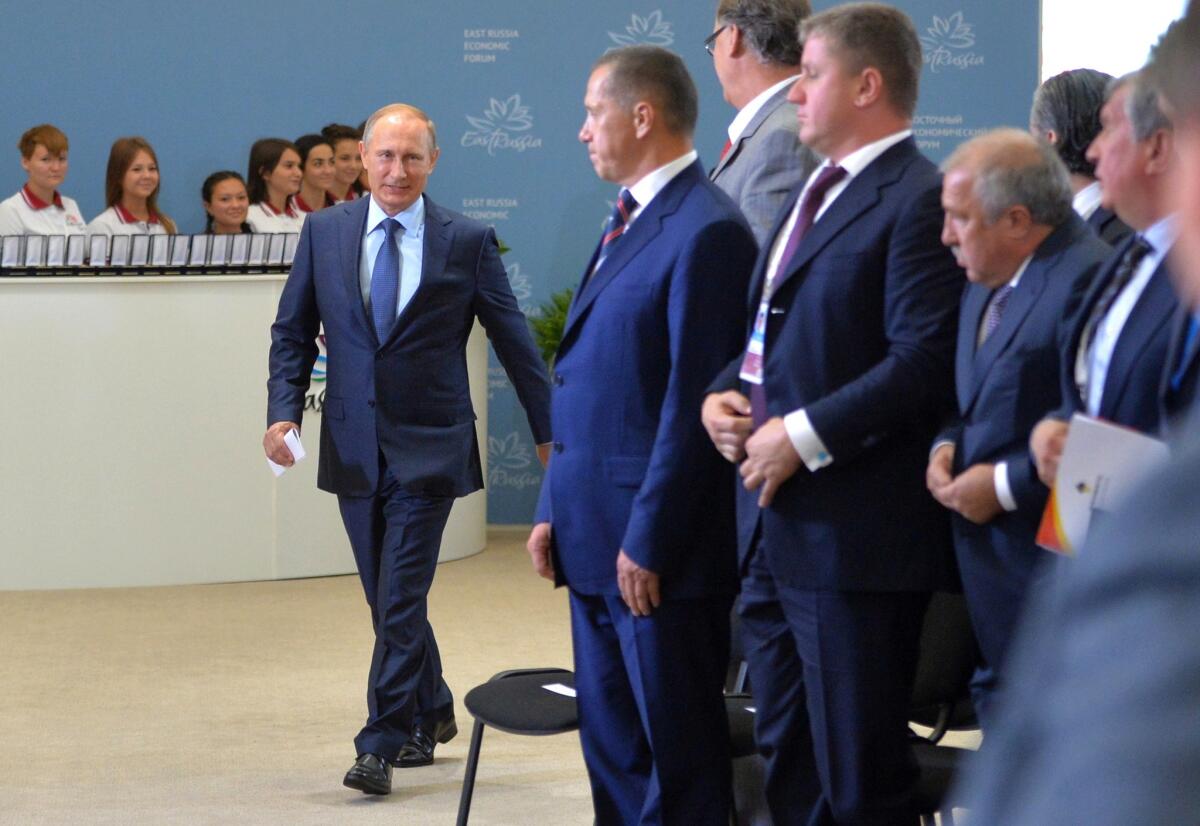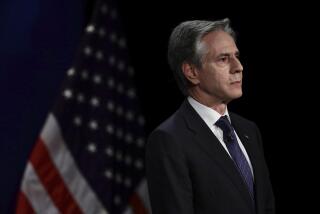Russia says Bulgaria’s refusal of flyovers to Syria is a U.S. plot

Russian President Vladimir Putin, left, arrives at the opening of the East Economic Forum in Vladivostok on Sept. 4, where he pressed his diplomatic initiative to end Syria’s civil war.
- Share via
Bulgaria has rejected a request from Moscow to allow Russian military transports to overfly its airspace en route to Syria.
The Kremlin says the planes are carrying humanitarian aid, but Washington sees them as part of an escalating Russian military role in Syria’s civil war and has reportedly sought to block them.
A senior Russian diplomat called the denied flyover permission a sign that Bulgaria has subjugated its foreign policy to the whims of Washington. A prominent Russian academic said the United States was out to “humiliate” Russia.
Russian officials confirmed in statements carried by Kremlin-influenced media that the Defense Ministry had requested that the governments in Bulgaria and Greece allow Russian military aircraft to fly through their airspace between Sept. 1 and Sept. 24 to deliver “relief aid” to war-torn Syria.
“We have enough information to express doubts [about] what Russia says these planes are transporting, humanitarian aid,” Bulgarian Foreign Ministry spokeswoman Betina Zhoteva told the Bloomberg news agency in Sofia.
Greek Foreign Ministry spokesman Constantinos Koutras told the Associated Press in Athens that it was still weighing whether to allow the Russian flights.
Officials in both Bulgaria and Greece have said they have been asked by the United States not to allow the overflights.
A more direct air route from Russia to the Syrian port of Tartus -- where the Kremlin maintains a Cold War-era naval base, and an international airport 35 miles away -- would overfly the Black Sea and Turkish territory. But the government in Ankara three years ago forced down a purported Russian passenger jet flight in Turkish airspace and found the plane to be carrying an air-defense radar system for Syria. Turkey has since denied Russia flyover of its territory, forcing the aircraft to instead reach the Mediterranean Sea via Bulgarian and Greek airspace.
U.S. intelligence sources last week told the Los Angeles Times in Washington that recent satellite imagery shows a significant buildup of Russian arms and equipment in Syria’s Latakia province, a stronghold of President Bashar Assad.
Russia has been a steadfast ally of Assad throughout the Syrian civil war, now in its fifth year and feeding an exodus of refugees inundating Europe this summer.
U.S. Secretary of State John F. Kerry called Russian Foreign Minister Sergei Lavrov over the weekend to voice the Obama administration’s concern about the apparent escalation of Russia’s involvement in the Syrian conflict. A State Department statement said Kerry warned his counterpart that any enhanced Russian military activity in Syria threatened to intensify the conflict that has killed 250,000, according to United Nations’ estimates.
Russian President Vladimir Putin has denied that increased Russian activity in Syria is a military buildup.
Bulgaria’s capitulation to U.S. demands that it bar Russian overflights “raises a question about [Bulgaria’s] sovereign right to make decisions about foreign planes crossing its airspace,” Russian Deputy Foreign Minister Mikhail Bogdanov told the Interfax news agency.
In a commentary carried by Russia’s official Tass news agency, Yevgeny Satanovsky, president of the Russian Institute of Middle East Studies, called the Bulgarian denial of Russian overflight the result of U.S. pressure on its NATO ally to sideline Russia and its recent diplomatic initiative to bring an end to the Syrian conflict.
“The situation is caused by a desire to harm Russia. It is being said absolutely openly that the task is to humiliate and down Russia,” Satanovsky said, claiming a secondary motive was “to shake and destabilize Putin’s regime.”
Follow @cjwilliamslat for the latest international news 24/7
More to Read
Sign up for Essential California
The most important California stories and recommendations in your inbox every morning.
You may occasionally receive promotional content from the Los Angeles Times.














